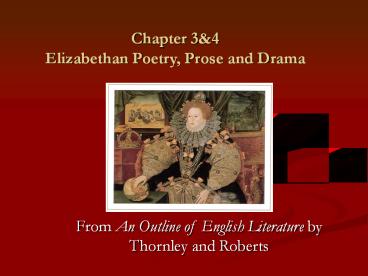Chapter 3 - PowerPoint PPT Presentation
Title: Chapter 3
1
Chapter 34 Elizabethan Poetry, Prose and Drama
- From An Outline of English Literature by Thornley
and Roberts
2
Sonnet
- The Great Elizabethan literary age is not
considered as beginning until 1579. (p.23) - Queen Elizabeth ruled from 1558 to 1603.
- Before 1579, Sir Thomas Wyatt and the Earl of
Surrey who wrote sonnets, which they learned to
do from the Italians - Surreys work is important because he wrote the
first blank verse in English - Wyatt mainly followed the Italian poet Petrarch
- The 14 lines rhyme abbaabba2 or 3 rhymes in the
last six lines (Shakespeare sonnets rhyme
ababcdcdefefgg).
3
Sonnets of Shakespeare
- Written between 1593-1600, printed in 1609
- For whom or to whom did he write them?
- Addressed to William Herbert (the Earl of
Pembroke), the Earl of Southampton - A girl, a rival poet, a dark-eyes beauty (p.24)
- Example on p.25 Who will believe my verse in
time to come
4
Edmund Spenser
- The Shepherds Calendar (1579) p.25
- A poem in 12 books, one for each month of the
year - Spenser experiments in meter and form
- The best pastorals written in English
- Pastoral concerning the life of shepherds
(usually shepherds in an imaginary Golden Age
living a simple and contended life in the open
air) - Other subjects praise of Queen Elizabeth,
discussion about religion, the sad death of a girl
5
The Shepherds Calendar (1579)
6
Edmund Spenser
- The Faerie Queene (1589-96)
- Queene is either Queen Elizabeth or Glory as a
person 12 knights represent different virtues - Epithalamion (1595) a marriage song
7
Sir Philip Sidney
- Astrophel and Stella (1591)
- A true Elizabethan gentleman of many activities
courtier, statesman, poet, soldier (p.27)
8
John Donne
- Metaphysical Poets (p.28)
- Wrote verse less beautiful and less musical
- Contained tricks of style and unusual images
- Mixed strong feeling with reason
9
Francis Bacon
- First appeared in 1597, then with additions in
1612 and 1625 (p.31) - Earlier essays are short, sharp, effective
- Some of the best known saying in English come
from his book Essays
10
Elizabethan Drama
- Comedies are better than tragedies (p.35)
- First English comedy Ralph Roister Doister
(1553) by Nicholas Udall - Rough verse
- Humor that can be found among country people
- First English tragedy Gorboduc, in blank verse,
performed in 1564 (p.36) - The Spanish Tragedy by Thomas Kyd, an example of
the tragedy of blood and death
11
Christopher Marlowe
1620 edition of Marlowe's The Tragical History of
Dr Faustus
- The first great dramatist
- Dr. Faustus (p.39)
- Acted in 1588
- A man named Faustus who sold his soul to the
devil so as to have power and riches in this life
12
- Dr. Faustus in his study room. Sketching by
Rembrandt
1974 Sketched at Edinburgh Festival. Ian McKellen
(Dr. Faustus with Bad and Good Angels
13
William Shakespeare
- Born and educated at Stratford-on-Avon (p.40-49)
- Worked in a theatre in London
- An actor and dramatist by 1592
- Early works historical plays
- Romeo and Juliet (1594-5) the Shakespeares
first great tragedy
14
Shakespeares Comedies
- A Comedy of Errors (1592-3?)
- The Taming of the Shrew
- The Two Gentlemen of Verona
- Loves Labours Lost
- A Midsummer Nights Dream (1595-6) shows
Shakespeares growing power in comedy - The Merchant of Venice (1596-7) Shylock
- As you Like It (1599?)
- Much Ado About Nothing (1598-9)
- Twelfth Nights (1600?) the perfection of
English comedy
15
Shakespeares Tragedies
- Hamlet (1600-1)
- King Lear (1606)
- Macbeth (1605-6)
- Othello (1604-5)
- The Tempest (1611-12) last complete play
16
Ben Johnson
- Every Man in His Humor (1598) his best known
play, humor means a quality made into a person,
a speciall foolishness or a strong feeling in a
man (p.49) - His characters are walking humors and not really
human - Sejanus a tragedy, played at the Globe Theatre
in 1603 by Shakespeares company - Volpone the Fox a comedy, also played at the
Globe (p.50)
17
Ben Johnson
- Believed in the unities of place, time and action
(p.50) - The scenes of a play need to be in one place
- The events of a play shouldnt spread over more
than 24 hours - Nothing outside the main story should be allowed
into the play - His other plays
- Everyman Out of His Humor (1599)
- Epicoene, The Silent Woman (1609)
- The Alchemist (1610)
- Bartholomew Fair (1614)

